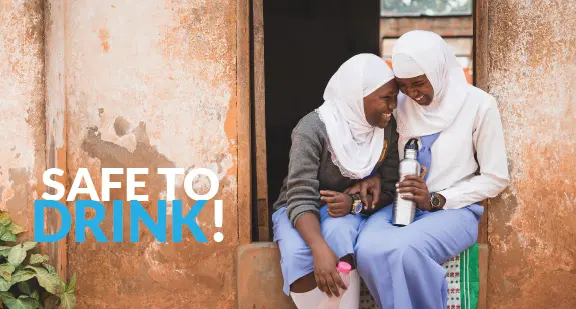Breaking The Silence The impact on Menstrual Health Management
In many parts of Africa, the journey of a girl through adolescence is fraught with challenges that extend beyond the physiological changes inherent to puberty. Among these, menstrual hygiene management (MHM) emerges as a pivotal issue that can have a significant impact on the education and well-being of young girls. The lack of sanitary privacy, a fundamental aspect of MHM, poses profound barriers to education, contributing to absenteeism, school dropouts, and diminished academic performance among adolescent girls.
Menstrual hygiene management encompasses not only the access to sanitary products but also the availability of safe and private facilities with clean water and soap. Accurate and comprehensive menstrual health education is also an essential requirement to help adolescent girls find their way through what can be, a very stressful time in their lives . Unfortunately, in numerous African communities, these essential resources and facilities are scarce or altogether absent. This scarcity is not just a matter of physical health but deeply entwined with the socio-cultural stigma surrounding menstruation, which often leads to shame, fear, and silence among girls.
The impact of inadequate MHM on girls’ education is profound. Studies have shown that girls who lack access to menstrual hygiene resources miss several days of school each month during their menstrual periods, leading to significant gaps in their education. This absenteeism is compounded by the discomfort and fear of embarrassment or stigmatization, which can lead to a complete withdrawal from the educational system. The ramifications extend beyond individual academic achievement, affecting the overall socio-economic development of communities and perpetuating cycles of gender inequality.
Addressing the lack of sanitary privacy is not merely a matter of improving health outcomes but is crucial for upholding the rights and dignity of girls and women. Ensuring that girls have access to the necessary MHM resources and education empowers them to manage their menstruation with dignity, attend school regularly, and participate fully in all aspects of societal life. This, in turn, paves the way for a more equitable and prosperous future, where gender does not dictate one’s educational and economic opportunities.
The importance of menstrual hygiene management in Africa cannot be overstated. It is a critical issue that requires immediate and sustained attention from governments, non-governmental organizations (NGOs), educators, healthcare providers, and communities. By collectively working towards improving MHM, we can remove a significant barrier to education for girls, fostering environments in which every child, regardless of gender, has the opportunity to learn, grow, and thrive.
The Lack of Sanitary Facilities in Schools: A Barrier to Education
In many African schools, the absence of adequate sanitary facilities significantly hinders the ability of girls to manage their menstruation safely, privately, and with dignity. This shortage is not limited to the unavailability of menstrual products but extends to the very infrastructure that supports basic hygiene practices. Schools often lack private changing areas, secure and sanitary disposal facilities for menstrual waste, and, critically, access to clean water. This deficit not only impacts the health and hygiene of menstruating girls but also serves as a profound barrier to their education and future prospects.
Impact of Inadequate Water and Sanitation Facilities
Clean water is fundamental to menstrual hygiene management. It is essential for washing hands and bodies, and for cleaning reusable menstrual materials. Without access to clean water, girls are forced to manage their menstruation under unsanitary conditions, increasing the risk of infections and health complications. The absence of private, gender-segregated toilets and washing facilities in schools further exacerbates this issue. Girls are left with no choice but to resort to unsafe and unhygienic practices or to skip school altogether during their menstrual periods to avoid the risk of embarrassment and stigma.
Educational Setbacks and Dropout Rates
The direct correlation between the lack of sanitary facilities and high dropout rates among girls in African schools is alarming. The discomfort and fear associated with managing menstruation in an unsupportive environment lead many girls to miss out on significant amounts of school time. Research indicates that girls can miss up to 20% of the school year due to inadequate MHM facilities. This absenteeism severely impacts their learning, resulting in falling behind their peers academically and, ultimately, in many cases, leading to dropping out of school entirely.
The dropout rate among girls due to inadequate menstrual hygiene management is not just a loss of education for the individual girl; it represents a broader impact on society. Educating girls is known to have a multiplier effect, leading to improved health, economic, and social outcomes for entire communities. When girls drop out of school, their potential to contribute to their communities and to break out of cycles of poverty is significantly diminished.
Bridging the Gap
Addressing the lack of sanitary facilities in schools is crucial for keeping girls in school. This involves not only the construction of private and gender-segregated toilets and washing facilities but also ensuring a sustainable supply of clean water. Furthermore, schools need to provide access to affordable menstrual hygiene products and to incorporate comprehensive menstrual health education into their curricula. This education should aim to destigmatize menstruation, provide girls with the knowledge to manage their menstrual health, and encourage supportive practices among boys and teachers.
The challenge of improving menstrual hygiene management in schools requires a multi-faceted approach involving government action, community support, and partnerships with NGOs and private sector stakeholders. By prioritizing the construction of adequate sanitary facilities and ensuring access to clean water and menstrual hygiene products, significant strides can be made towards reducing dropout rates and eliminating one of the critical barriers to education for girls in Africa. Investing in menstrual hygiene management is an investment in the future of girls and the broader development goals of African nations.
Addressing the Challenge: Improving Sanitary Privacy Through Initiatives and Strategies
The lack of sanitary facilities in schools across Africa significantly hampers the ability of girls to manage their menstruation with dignity and comfort, directly impacting their education through increased dropout rates and educational setbacks. Addressing this issue requires comprehensive initiatives and strategies that not only focus on improving physical infrastructure but also on changing societal attitudes towards menstruation. Here are key initiatives and strategies that can be implemented to improve sanitary privacy and menstrual hygiene management in schools:
- Infrastructure Development: Building private, safe, and gender-segregated sanitation facilities in schools is fundamental. These facilities should be equipped with running water and adequate space for changing, along with secure disposal options for menstrual products. Ensuring these basic infrastructural improvements will significantly reduce the barriers to attendance for menstruating girls.
- Access to Clean Water: Clean water is not just a necessity for drinking but is crucial for menstrual hygiene. Schools must have a reliable supply of clean water to enable girls to manage their menstrual hygiene effectively. This can be facilitated through the construction of boreholes, rainwater harvesting systems, and ensuring the maintenance of these water sources.
- Provision of Menstrual Hygiene Products: Governments and NGOs can collaborate to provide free or subsidized menstrual hygiene products such as sanitary pads, tampons, or menstrual cups. Making these products readily available in schools can alleviate the financial burden on girls and their families and ensure that menstruation does not stand in the way of education.
- Education and Awareness Campaigns: Implementing comprehensive menstrual health education programs in schools is critical. These programs should educate both boys and girls about menstruation to dispel myths and combat stigma. Teachers and school staff should also receive training to support menstruating students sensitively and effectively.
- Community Engagement and Support: Engaging parents, community leaders, and religious leaders in dialogue about menstrual hygiene and the importance of education for girls can foster a supportive environment. Community-based initiatives can also provide additional resources and support for girls, such as local production of sanitary pads or community-led education sessions.
- Policy and Advocacy: Advocating for policy changes at the national and local levels is crucial to institutionalizing support for menstrual hygiene management. Policies that mandate the provision of sanitary facilities in schools, allocate funding for menstrual hygiene management, and integrate menstrual health education into the national curriculum can create a sustainable framework for support.
- Research and Monitoring: Continuous research and monitoring are necessary to assess the effectiveness of MHM initiatives and make data-driven adjustments. Gathering data on attendance, dropout rates, and the impact of MHM interventions can help to refine strategies and demonstrate the value of investing in menstrual hygiene management.
By implementing these strategies, schools and communities can make significant strides in improving sanitary privacy and menstrual hygiene management. This comprehensive approach not only addresses the immediate needs of menstruating girls but also contributes to a broader cultural shift towards recognizing and supporting the rights and dignity of girls and women. Ultimately, improving MHM in schools is a critical step towards ensuring that girls can pursue their education without barriers, laying the foundation for gender equality and empowerment.
Top of Form
Studies and reports have highlighted the significant impact that lack of access to menstrual hygiene resources has on girls’ education globally. A comprehensive approach by the University of Michigan School of Public Health on period poverty as a public health crisis underscores the issue, noting that 1 in 5 girls may miss school due to the lack of menstrual products, indicating how period poverty contributes to educational disparities??.
The World Bank also acknowledges the profound effect of menstrual hygiene management (MHM) on educational attendance. It reports interventions in schools, such as the provision of MHM-enabled WASH (Water, Sanitation, and Hygiene) facilities and menstrual hygiene education, aimed at reducing school absenteeism among girls. This effort is part of a larger initiative to address the nearly 113 million adolescent girls in India at risk of dropping out due to menstrual issues, highlighting the global scale of the challenge??.
Further emphasizing the severity of this issue, Global Citizen highlights how period poverty and stigma contribute to keeping girls out of school. It mentions that girls may miss 10-20% of school days due to their periods, with some eventually dropping out entirely. This absenteeism is often due to a lack of access to sanitary products and the stigma surrounding menstruation, which can lead to discrimination and exclusion from educational opportunities. In some countries, the cost of sanitary products is prohibitively expensive, exacerbating the issue. Additionally, entrenched superstitions and negative narratives around menstruation further alienate girls from their education??.
References:
https://blogs.worldbank.org/education/globally-periods-are-causing-girls-be-absent-school
https://sph.umich.edu/pursuit/2020posts/period-poverty.html
https://www.globalcitizen.org/en/content/menstrual-hygiene-day-education/
https://www.globalcitizen.org/en/content/menstrual-hygiene-day-education/

